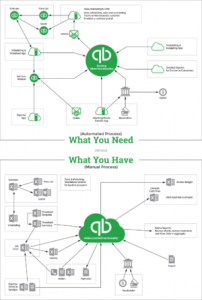This blog is about what your accountant does for you. Most businesses will need Bookkeepers and Tax Advisors; some businesses will require Auditors, but all businesses need accountants like us: Business Advisors.
Bookkeepers process transactions – creating invoices, requesting purchases, collecting cash, making payments – and probably also handle compliance matters like filing and paying for your payroll and sales taxes. Bookkeeping must be done accurately: it provides the data for all your decisions, and any mistakes – especially around compliance matters – can create long-lasting and expensive headaches. On the plus side, Bookkeepers are the least expensive, and you can hire them on a per-hour basis.
You’ll want to retain Tax Accountants (or Tax Advisors), who have specialist expertise in corporate and personal income taxes, sales taxes, and (where required) foreign taxes. Canadian businesspeople should speak to experts in Scientific Research and Experimental Development (SRED; see Shred Your R&D Costs).
Profit Breakthrough:
A Tax Advisor who can translate from “Tax” into “English” will reduce your stress, and will help you reduce your tax bill in the short term (choosing the most tax-efficient mix of salary, dividends, and bonuses for you and any employees) and in the longer term (setting up a corporate and trust structure to minimize the tax hit if and when you sell your business.)
These are the most expensive, but you can compare their invoices to the tax savings (your tax bill before and after their advice) to evaluate the ROI.
Your investors (family, friends, your bank) may require that you hire Auditors. Auditors perform the business equivalent of a pre-purchase safety inspection on a car. The Mechanic issues a pass/fail report, in effect evaluating the seller’s story about the car. The Auditor does roughly the same: issuing one of three reports that evaluates the company’s story (its financial statements) about its performance. Critically, both reports should flag critical plot-points that might otherwise be left out of the story.
There are three possible reports. You get what you pay for. In order of cheapest to most expensive (and least to most work required):
- A Compilation report says “these statements add/ balance; we didn’t really look at what they are telling you”.
- A Review says “we did some ratio analysis, and had a brief look at the notes. We didn’t find anything that would contradict what these financials say”.
- An Audit report says “we analysed ratios and tested transactions. We checked that all the required Notes were there. We’re confident that what these financials tell you is true”.
(There is a bit more to the types of report than that, but you get the flavour of it.)
The car buyer pays the Mechanic. Most are happy to pay, because the report tells them things about the car they probably wouldn’t otherwise know. On the other hand, the company pays the Auditor’s fees. Savvy owner-managers know that Reviews or Audits confirm not just that the Story is telling the truth (the revenues and assets aren’t overstated), but that it’s the whole truth (the expenses and liabilities aren’t understated). In other words, we typically recommend that our clients get at least a Review each year. The benefits typically outweigh the costs.
Most, if not all, Auditors have in-house Tax Advisors: this benefits them (the tax work is more lucrative) and you (economies of scale by sending your documents to one firm).
Profit Breakthrough:
A strong Bookkeeper, Tax Advisor, and Auditor are all necessary, not merely sufficient. The fourth, and arguably most important, accountant you’ll hire is your Business Advisor. They can be in-house or outsourced based on your needs, and would be called “Controller”, “VP Finance”, or “CFO”. The title is less important than the value they bring to you. At a minimum:
- Review (or help create) your business plan and budgets (Fail to plan, plan to fail). Are the assumptions reasonable? Do the numbers add up?
- Recommend strong Bookkeepers, Tax Advisors, and Auditors.
- Identify places where you can save money.
The last item is the first-among-equals in terms of payback. Anyone can recommend cutting overheads, but a good Business Advisor will make your processes more Efficient (doing things right) and more Effective (doing the right things), for the best Economy (more bang for the same, or fewer, bucks). The immediate payoff is cash savings, with a knock-on benefit of less stress for you and your staff. The longer term and bigger payoff is getting better information, faster, and ideally for less money – it’s a huge competitive advantage.
The upshot: Your business needs several types of Accountants: a Bookkeeper, a Tax Advisor, and possibly an Auditor. Most importantly, you should have a Business Advisor. Expensive, but worth it beyond the out of pocket costs: every hour of your time you don’t spend on finance is an hour you can spend on customer service.
TL, DR? Here it is in a table:
| Expertise | Tasks they perform | Costs | Benefits |
| Bookkeepers | Process financial transactions and handle compliance matters | Fairly low cost – hire on a dollar-per-hour basis. | Reduced stress |
| Tax Advisors | Provide advice on corporate, personal, and sales taxes (and possibly others). Can also file your tax returns for you. | More expensive than auditors | Short term and long term tax savings |
| Auditors | Report on the accuracy of your financial statements to third parties (think “safety inspection on a car”). | Less expensive than Tax Advisors | Peace of mind for you/ your investors.
Synergies if the same firm is also your Tax Advisor. |
| Business Advisors |
|
Cheap at twice the price. | More bang for the buck – less stress, reduced costs – and a competitive advantage that comes from faster, more accurate, and cheaper information. |

